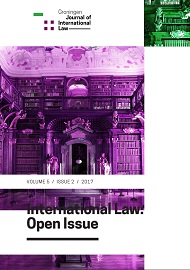Judicial Interpretation of the Convention for the Prevention and Punishment of the Crime of Genocide: What Rules Apply When Determining State and Individual Responsibility?
DOI:
https://doi.org/10.21827/5a6afa066ee90Keywords:
INTERPRETATION OF TREATIES, GENOCIDE CONVENTION, INTERNATIONAL TRIBUNALS, INTERNATIONAL CRIMINAL LAWAbstract
The rules of interpretation of the 1969 Vienna Convention on the Law of Treaties are considered customary law and have been extensively applied by different international tribunals, including in cases involving the commission of the crime of genocide, either before the International Court of Justice or before international criminal tribunals. These rules are not regarded as an exhaustive list of interpretative techniques, but rather as an umbrella set of rules that do not exclude other principles or means compatible with them, and thus, offer enough flexibility to be applied by different fora. This paper examines the manner in which, in the context of genocide cases, the International Court of Justice and international criminal tribunals have resorted to the rules of interpretation in order to identify whether all those tribunals (regardless of their jurisdiction ratione personae) have applied Articles 31 and 32 of the Vienna Convention on the Law of Treaties. Moreover, it analyses whether those articles are equally applicable in cases where the responsibility of the State is under discussion and in criminal cases seeking to determine the responsibility of the individual. It is argued that even though international criminal law is deemed to have caused a change to the traditional paradigm of the international system by bringing the individual to its forefront and causing a rupture in the State-centric logic that had prevailed since its origins, Articles 31 and 32 have proved themselves adaptable enough in order to be applied to the realm of international criminal law.
Published
Issue
Section
Open Access Creative Commons


